Arcade Fire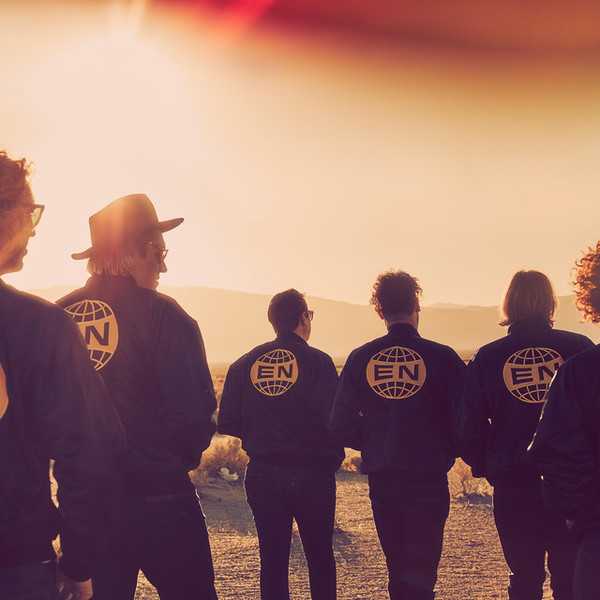 | ||
| Allmusic Biography : Building a devoted fan base with their interactive live performances and rousing, multi-instrumental, gang-chorus delivery, Canadas Arcade Fire became underground favorites when they debuted in 2004 with the critically acclaimed baroque-pop-meets-indie-rock Funeral. Stylistically evolving over the years, the unabashedly earnest group took its first foray into darker textures and electronic flourishes with 2007s politically charged Neon Bible, the first of a string of chart-topping albums. They hit a commercial peak with 2010s nostalgic, Grammy-winning effort, The Suburbs, which took home the Album of the Year Award in 2011. With the incorporation of heavy synths and higher concepts like modern living in a technologically connected and commercially driven world, they extended chart dominance into the late 2010s with the island-beat double-album Reflektor (2013) and the divisive, disco-kissed Everything Now (2017). Originally comprising Régine Chassagne, Richard Parry, Tim Kingsbury, and brothers William and Win Butler, Arcade Fire formed during the summer of 2003, after Win spotted Chassagne singing jazz standards at a Montreal art exhibit. The grandson of famed swing-era bandleader Alvino Rey, Win was quickly charmed by Chassagnes performance, leading the two to launch a songwriting partnership. Romance followed shortly thereafter, and the duo expanded its sound by gathering Parry on organ, Kingsbury on bass, and Win Butlers younger brother, William, on synthesizer and percussion. Drawing from the bandmates varied influences, Arcade Fire began mining an eclectic mix of bossa nova, punk, French chanson, and classically tinged pop music, referencing everything from U2s passion to David Bowies eclecticism in the process. Arcade Fire issued a self-titled EP in 2003, having briefly retreated to Maine for the recording sessions. Propelled by Win Butlers quavering vocals and his bandmates symphonic swells, the disc helped earn the band an official offer from Merge Records. The bandmates luck faltered later that year, however, when Chassagnes grandmother passed away. The Butler brothers grandfather followed suit in March 2004, and Parrys aunt died one month later. Seeking catharsis in the studio, the members of Arcade Fire funneled their energies into the creation of Funeral. Released in September 2004, the debut album was met with unanimous acclaim -- both commercially and critically -- and Arcade Fire found themselves maintaining a nearly constant presence on the road, playing such high-profile festivals as Lollapalooza and Coachella between a slew of smaller club dates. They also appeared on the cover of Time magazines Canadian edition, garnered a Grammy nomination for Best Alternative Music Album, rubbed shoulders with superfan David Bowie, and toured alongside U2. Following an exhausting year, Arcade Fire decamped to a church outside of Montreal to work on a second release. The ambitious Neon Bible arrived in March 2007, featuring such grand ornamentations as a pipe organ, a military choir, and a full orchestra. The album peaked at number two and sparked another tour, which found the band playing more than 120 shows over the course of a year. When touring wrapped up in early 2008, Arcade Fire played several shows in support of presidential candidate Barack Obama before beginning work on a third album. The resulting The Suburbs, an eclectic 16-track ode to childhood, suburban sprawl, and middle-class dreams both won and lost, arrived on August 2, 2010. The record was universally acclaimed and reached number one in both the U.S. and U.K. album charts. The following year they won a host of awards, including prestigious accolades such as a Grammy for Album of the Year, the Polaris Prize, and BRIT awards for both Best International Album and Group, among other honors and nominations. Their success followed them on the road as they sold out shows across the globe, and in 2011 they released a deluxe version of The Suburbs that included a short film -- titled Scenes from the Suburbs -- directed by Spike Jonze. They began work on their fourth release in 2012 and enlisted LCD Soundsystem frontman James Murphy for production duties. The critically acclaimed double album, entitled Reflektor, was released in October 2013, and was followed by an ambitious world tour. A documentary film of the tour, The Reflektor Tapes, was released in 2015, as was an accompanying EP of the same name. May 2017 saw Arcade Fire perform an intimate secret show in Montreal, where they played six new songs. At the end of the month they released "Everything Now," the lead single from the highly anticipated fifth studio album of the same name, which dropped later that July. Featuring production by Daft Punks Thomas Bangalter, Pulps Steve Mackey, Portisheads Geoff Barrow, and longtime producer Markus Dravs, Everything Now also featured the singles "Creature Comfort" and "Electric Blue." | ||
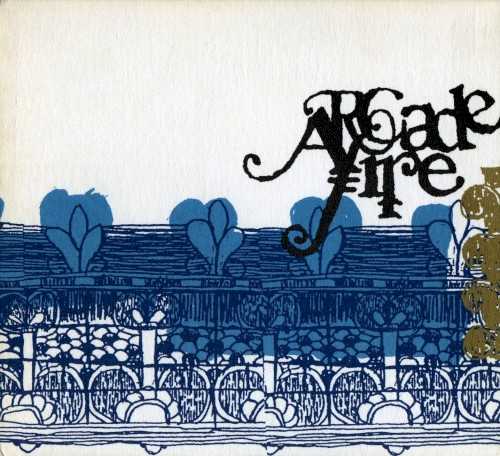 | Album: 1 of 7 Title: Arcade Fire Released: 2003-06-15 Tracks: 7 Duration: 33:03 Scroll: Up Down Top Bottom 25% 50% 75% Wikipedia Allmusic AlbumCover | 1 Old Flame (03:59) 2 I’m Sleeping in a Submarine (02:47) 3 No Cars Go (06:04) 4 The Woodland National Anthem (03:59) 5 My Heart Is an Apple (04:27) 6 Headlights Look Like Diamonds (04:25) 7 Vampire/Forest Fire (07:20) |
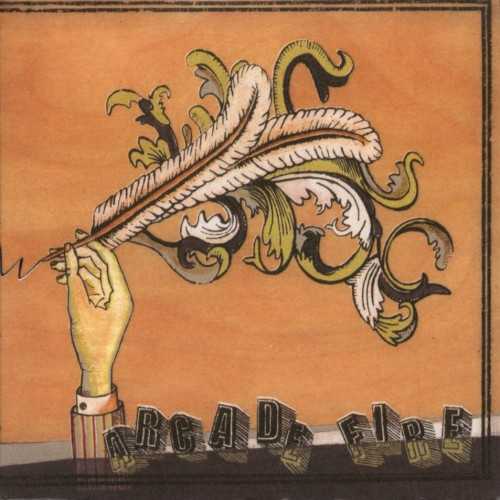 | Album: 2 of 7 Title: Funeral Released: 2004-09-14 Tracks: 14 Duration: 1:06:04 Scroll: Up Down Top Bottom 25% 50% 75% Spotify Allmusic AlbumCover | 1 Neighborhood #1 (Tunnels) (04:48) 2 Neighborhood #2 (Laïka) (03:32) 3 Une année sans lumière (03:40) 4 Neighborhood #3 (Power Out) (05:12) 5 Neighborhood #4 (7 Kettles) (04:49) 6 Crown of Love (04:42) 7 Wake Up (05:35) 8 Haïti (04:07) 9 Rebellion (Lies) (05:10) 10 In the Backseat (06:20) 1 My Buddy (Alvino Rey Orchestra) (02:35) 2 Neighborhood #3 (Power Out) (August session) (05:35) 3 Brazil (03:56) 4 Neighborhood #3 (Power Out) (live) (05:57) |
| Funeral : Allmusic album Review : Fronted by the husband-and-wife team of Win Butler and Régine Chassagne, the Arcade Fires emotional debut -- rendered even more poignant by the dedications to recently departed family members contained in its liner notes -- is brave, empowering, and dusted with something that many of the indie rock genres more contrived acts desperately lack: an element of real danger. Funerals mourners -- specifically Butler and Chassagne -- inhabit the same post-apocalyptic world as London Suedes Dog Man Star; they are broken, beaten, and ferociously romantic, reveling in the brutal beauty of their surroundings like a heathen Adam & Eve. "Neighborhood #1 (Tunnels)," the first of four metaphorical forays into the geography of the soul, follows a pair of young lovers who meet in the middle of the town through tunnels that connect to their bedrooms. Over a soaring piano lead thats effectively doubled by distorted guitar, they reach a Lord of the Flies-tinged utopia where they cant even remember their names or the faces of their weeping parents. Butler sings like Radioheads Jonny Greenwood used to play, like a lion-tamer whose whip grows shorter with each and every lash. He can barely contain himself, and when he lets loose its both melodic and primal, like Berlin-era Bowie or British Sea Power. "Neighborhood #2 (Laïka)" examines suicidal desperation through an angular Gang of Four prism; the hypnotic wash of strings and subtle meter changes of "Neighborhood #4 (7 Kettles)" winsomely capture the mundane doings of day-to-day existence; and "Neighborhood #3 (Power Out)," Funerals victorious soul-thumping core, is a goose bump-inducing rallying cry centered around the notion that "the powers out in the heart of man, take it from your heart and put it in your hand." Arcade Fire are not bereft of whimsy. "Crown of Love" is like a wedding cake dropped in slow motion, utilizing a Johnny Mandel-style string section and a sweet, soda-pop-stand chorus to provide solace to a jilted lover yearning for a way back into the fold, and "Haiti" relies on a sunny island melody to explore the complexities of Chassagnes mercurial homeland. However, its the sheer power and scope of cuts like "Wake Up" -- featuring all 15 musicians singing in unison -- and the mesmerizing, early-Roxy Music pulse of "Rebellion (Lies)" that make Funeral the remarkable achievement that it is. These are songs that pump blood back into the heart as fast and furiously as its draining from the sleeve on which it beats, and by the time Chassagne dissects her love of riding "In the Backseat" with the radio on, despite her desperate fear of driving, Funerals singular thread is finally revealed; love does conquer all, especially love for the cathartic power of music. | ||
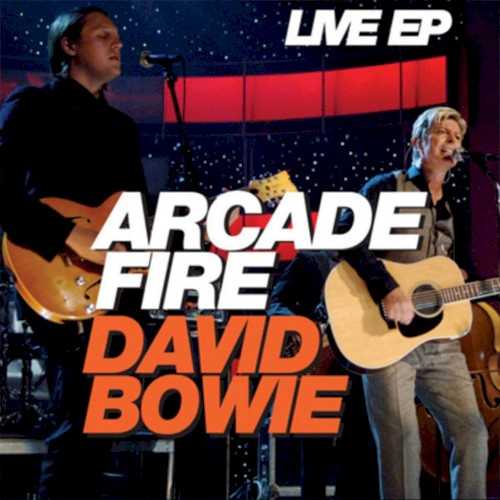 | Album: 3 of 7 Title: Live EP (live at Fashion Rocks) Released: 2005 Tracks: 3 Duration: 14:24 Scroll: Up Down Top Bottom 25% 50% 75% AlbumCover | 1 Life on Mars? (04:54) 2 Wake Up (05:43) 3 Five Years (03:45) |
 | Album: 4 of 7 Title: Neon Bible Released: 2007-03-02 Tracks: 11 Duration: 46:57 Scroll: Up Down Top Bottom 25% 50% 75% Spotify Allmusic AlbumCover | 1 Black Mirror (04:11) 2 Keep the Car Running (03:29) 3 Neon Bible (02:16) 4 Intervention (04:19) 5 Black Wave/Bad Vibrations (03:57) 6 Ocean of Noise (04:53) 7 The Well and the Lighthouse (03:56) 8 (Antichrist Television Blues) (05:10) 9 Windowsill (04:16) 10 No Cars Go (05:43) 11 My Body Is a Cage (04:47) |
| Neon Bible : Allmusic album Review : When Montreals Arcade Fire released Funeral in 2004, it received the kind of critical and commercial acclaim that most bands spend their entire careers trying to attain. Within a year the group was headlining major festivals and sharing the stage with U2 and New York Citys "two Davids" (Bowie and Byrne), all the while amassing a devoted following that descended upon shows like sinners at a tent revival, engaging in the kind of artist appreciation that can easily turn to a false sense of ownership. On their alternately wrecked and defiant follow-up, Neon Bible, one can sense a bit of a Wall being erected (Win Butlers Roger Waters/Bruce Springsteen/Garrison Keillor-style vocal delivery notwithstanding) around the group. If Funeral was the goodbye kiss on the coffin of youth, then Bible is the bitter pint (or pints) after a long days work. The brooding opener, "Black Mirror," with its sinister "Suffragette City"-inspired groove and murky refrain of "Mirror, Mirror on the wall/Show me where them bombs will fall," sets an immediate world-weary tone that permeates that majority of Neon Bibles Technicolor pages. As expected, those sentiments are amplified with all of the majestic and overwrought power that has divided listeners since the groups ascension to indie rock royalty, but despite a tendency toward midtempo balladry and post-fame cynicism, theyre anything but dull. Its the triumphant orchestral remake of live staple "No Cars Go" and the infectious "Keep the Car Running" -- the latter sounds like a 21st century update of John Cafferty & the Beaver Brown Bands "On the Dark Side" -- that will most appeal to Funeral fans, and when the bottom drops out a minute and a half into the pipe organ-led "Intervention" and Butler wails "Whos gonna reset the bone," its hard not get caught up in all of the dystopian fervor. "Black Wave/Bad Vibrations" and "The Well and the Lighthouse" continue the bands explorations into progressive song structures and lush mini-suites, the thunder-filled "Ocean of Noise" is reminiscent of Bossanova-era Pixies, and the stark (at first) closer "My Body Is a Cage" straddles the sawhorse of earnest desperation and classic rock & roll self-absorption so effortlessly that it demands to be either turned off or all the way up. Neon Bible takes a few spins to digest properly, and like all rich foods (orchestra, harps, and gospel choirs abound), its as decadent as it is tasty -- theatricality has never been a practice that the collective has shied away from -- but theres no denying the Arcade Fires singular vision, even when it blurs a little. | ||
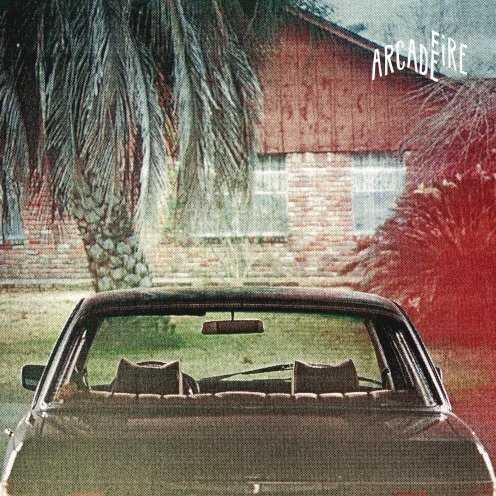 | Album: 5 of 7 Title: The Suburbs Released: 2010-07-03 Tracks: 16 Duration: 1:04:04 Scroll: Up Down Top Bottom 25% 50% 75% Spotify TrackSamples Allmusic AlbumCover | 1 The Suburbs (05:15) 2 Ready to Start (04:16) 3 Modern Man (04:39) 4 Rococo (03:56) 5 Empty Room (02:51) 6 City With No Children (03:11) 7 Half Light I (04:13) 8 Half Light II (No Celebration) (04:27) 9 Suburban War (04:45) 10 Month of May (03:50) 11 Wasted Hours (03:20) 12 Deep Blue (04:28) 13 We Used to Wait (05:01) 14 Sprawl I (Flatland) (02:54) 15 Sprawl II (Mountains Beyond Mountains) (05:25) 16 The Suburbs (continued) (01:27) |
| The Suburbs : Allmusic album Review : Montreals Arcade Fire successfully avoided the sophomore slump with 2007s apocalyptic Neon Bible. Heavier and more uncertain than their nearly perfect, darkly optimistic 2004 debut, the album aimed for the nosebleed section and left a red mess. Having already fled the cold comforts of suburbia on Funeral and suffered beneath the weight of the world on Neon Bible, it seems fitting that a band once so consumed with spiritual and social middle-class fury should find peace "under the overpass in the parking lot." If nostalgia is just pain recalled, repaired, and resold, then The Suburbs is its sales manual. Inspired by brothers Win and William Butlers suburban Houston, Texas upbringing, the 16-track record plays out like a long lost summer weekend, with the jaunty but melancholy Kinks/Bowie-esque title cut serving as its bookends. Meticulously paced and conservatively grand, fans looking for the instant gratification of past anthems like "Wake Up" and "Intervention" will find themselves reluctantly defending The Suburbs upon first listen, but anyone who remembers excitedly jumping into a friends car on a sleepy Friday night armed with heartache, hope, and no agenda knows that patience is key. Multiple spins reveal a work thats as triumphant and soul-slamming as it is sentimental and mature. At its most spirited, like on "Empty Room," "Rococo," "City with No Children," "Half Light II (No Celebration)," "We Used to Wait," and the glorious Régine Chassagne-led "Sprawl II (Mountains Beyond Mountains)," the latter of which threatens to break into Blondies "Heart of Glass" at any moment, Arcade Fire make the suburbs feel positively electric. Quieter moments reveal a changing of the guard, as Win trades in the Springsteen-isms of Neon Bible for Neil Young on "Wasted Hours," and the ornate rage of Funeral for the simplicity of a line like "Lets go for a drive and see the town tonight/Theres nothing to do, but I dont mind when Im with you," from album highlight "Suburban War." The Suburbs feels like Richard Linklaters Dazed & Confused for the Y generation. Its serious without being preachy, cynical without dissolving into apathy, and whimsical enough to keep both sentiments in line, and of all of their records, it may be the one that ages the best. | ||
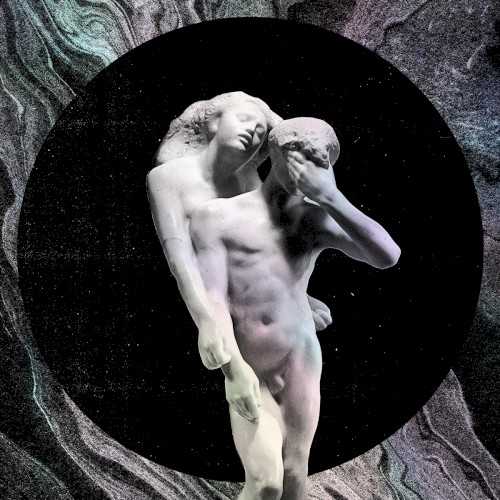 | Album: 6 of 7 Title: Reflektor Released: 2013-10-25 Tracks: 13 Duration: 1:15:13 Scroll: Up Down Top Bottom 25% 50% 75% Spotify TrackSamples Allmusic AlbumCover | 1 Reflektor (07:33) 2 We Exist (05:44) 3 Flashbulb Eyes (02:42) 4 Here Comes the Night Time (06:30) 5 Normal Person (04:22) 6 You Already Know (03:59) 7 Joan of Arc (05:26) 1 Here Comes the Night Time II (02:52) 2 Awful Sound (Oh Eurydice) (06:13) 3 Its Never Over (Hey Orpheus) (06:42) 4 Porno (06:02) 5 Afterlife (05:52) 6 Supersymmetry / [unknown] (11:16) |
| Reflektor : Allmusic album Review : After stunning the mainstream pop machine into a state of huffy, new school e-disbelief by beating out Eminem, Lady Antebellum, Lady Gaga, and Katy Perry for the 2011 Album of the year Grammy, Arcade Fire seemed poised for a U2-style international coup, but the Suburbs, despite its stadium-ready sonic grandiosity, was far too homespun and idiosyncratic to infect the masses in the same way as the Joshua Tree or Achtung Baby. Reflektor, the Montreal collectives much anticipated fourth long-player and first double-album, moves the group even further from pop culture sanctification with a seismic yet impenetrable 13-track set (at 75 minutes it’s one minute over standard single disc capacity) that guts the building but leaves the roof intact. Going big was never going to be a problem, especially for a band so well-versed in the art of anthem husbandry, and theyre still capable of shaking the rafters, as evidenced by the cool and circuitous, Roxy Music-forged, David Bowie-assisted title cut, the lush, Regine Chassagne-led “Its Never Over (Oh Orpheus),” and the impossibly dense and meaty “We Exist,” but what ultimately keeps Reflektor from sticking the landing is bloat. The stylistic shifts, courtesy of LCD Soundsystems James Murphy, aren’t nearly as jarring as the turgid and Tiki-colored, almost seven-minute “Here Comes the Night Time,” the six minutes of rewinding tape that serve as the coda for the otherwise lovely “Supersymmetry,” or the unnecessarily drawn-out fountain of white noise that should seamlessly connect the Gary Glittery “Joan of Arc” with the Flaming Lips-ian “Here Comes the Night Time, Pt. 2,” but doesn’t because the songs are on separate discs. Flush with artistic capital, they went on a bender, and in the process lost some of the warmth, jubilation, and capacity for empathy that made their first three efforts so inclusive. Nevertheless, Reflektor is as fascinating as it is frustrating, an oddly compelling miasma of big pop moments and empty sonic vistas that offers up a (full-size) snapshot of a band at its commerical peak, trying to establish eye contact from atop a mountain. | ||
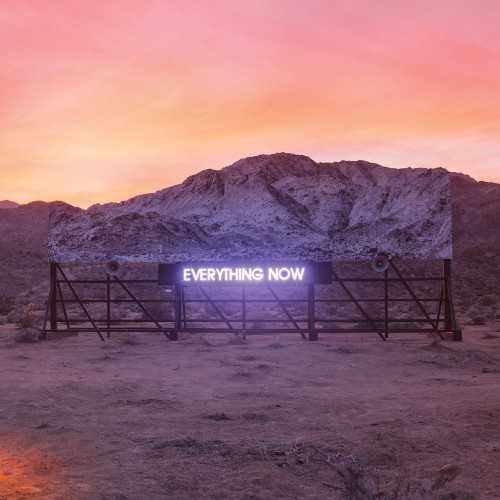 | Album: 7 of 7 Title: Everything Now Released: 2017-07-27 Tracks: 13 Duration: 47:16 Scroll: Up Down Top Bottom 25% 50% 75% Spotify Allmusic AlbumCover | 1 Everything_Now (continued) (00:46) 2 Everything Now (05:03) 3 Signs of Life (04:37) 4 Creature Comfort (04:44) 5 Peter Pan (02:49) 6 Chemistry (03:38) 7 Infinite Content (01:37) 8 Infinite_Content (01:42) 9 Electric Blue (04:02) 10 Good God Damn (03:34) 11 Put Your Money on Me (05:53) 12 We Don’t Deserve Love (06:29) 13 Everything Now (continued) (02:22) |
| Everything Now : Allmusic album Review : On their fifth album, Everything Now, Arcade Fire make their first significant stumble, opting more for style over their typical substance. In their search for whats real in an ephemeral and oversaturated society, theyve fallen prey to the very gloss they seek to lampoon, resulting in a lack of the emotion that defined their earlier efforts. Also, with lyrics that are a little too on the nose, much of Everything Now ends up being too clever for its own good, which distracts from some otherwise interesting additions to their catalog. Take the two-part "Infinite Content"/"Infinite_Content," a garage rock blast that morphs into an otherwise dreamy, Suburbs-esque moment. As frontman Win Butler repeatedly spits "All your money is already spent/On infinite content!" and "Infinite content/Were infinitely content," listeners might find themselves wearied from the exaggerated repetition, having gotten the point loud and clear long before hes done shouting. The lyrics found on "Creature Comfort" are another good summation of this issue: in an effort to say something meaningful, Arcade Fire simply sound like theyre trying too hard. A handful of standouts will no doubt stand the test of time, but unfortunately not enough for a cohesive and fulfilling statement. Thematic flubs aside, the production and sonic directions on Everything Now sound great. The band recruited an enviable team -- including Daft Punks Thomas Bangalter, Portisheads Geoff Barrow, Pulps Steve Mackey, and longtime collaborator Markus Dravs -- that infuses a groove and danceability that Arcade Fire first touched upon on Reflektor. On the bright title track, the dramatically funky "Signs of Life," and the glittering "Electric Blue," Everything Now fully embraces the disco spirit. Elsewhere, the band trades the sparkle of the disco ball for visceral throb, like on the urgent "Creature Comfort," the strutting "Good God Damn," and the hypnotizing "Put Your Money on Me," which sounds like Röyksopp remixing LCD Soundsystem. Peppering Everything Now are some potentially divisive experiments -- like the heavy dub of "Peter Pan" and the New Orleans big-band jam of "Chemistry" -- that dont really fit in with the rest of the album. Theyre interesting experiments outside the bands comfort zone, but distract from the albums flow. Overall, there is just enough on Everything Now to appease fans and attract newcomers with accessible singles, but as an Arcade Fire record, its unfortunately too inconsistent and ultimately hollow. Arcade Fire sought to make a Big Statement but instead produced one of their least impactful works. | ||